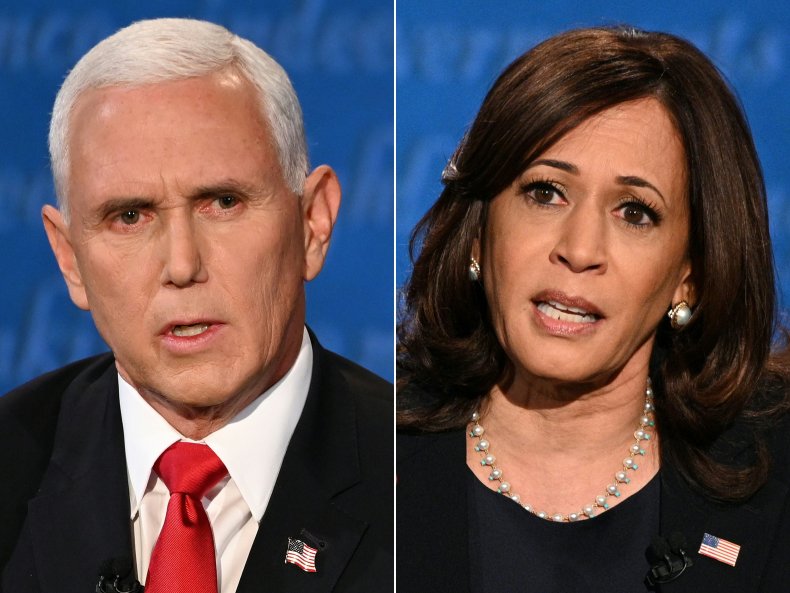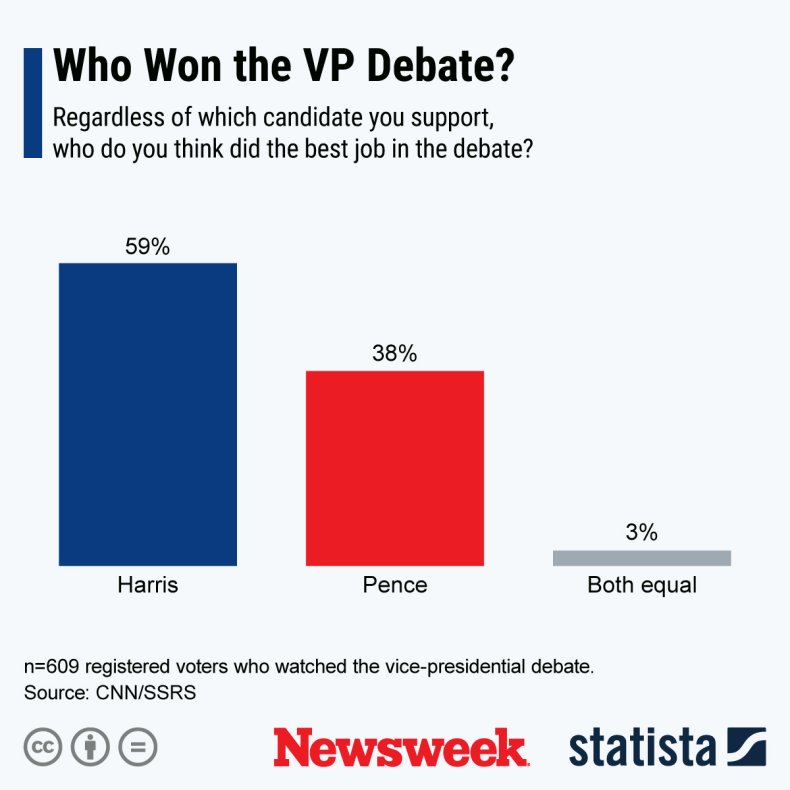BY JENNI FINK
In his Wednesday night debate with Senator Kamala Harris, Vice President Mike Pence defended Donald Trump as ably as anyone could, given that the resurgent COVID-19 crisis, which Pence is in charge of handling, meant that the debate had to be conducted with plexiglass dividers.
But it's likely that nothing Pence said threatened former Vice President Joe Biden's lead. And nothing he did dislodged a determined fly from his head where it landed—and stayed—for nearly two minutes as he championed the Trump administration's support for law enforcement.
The fly was the elephant in the room, as it were: a reminder that no matter how strongly Pence portrayed the administration through its accomplishments, it's impossible to ignore the missteps.
Harris and Pence's 90-minute debate at the University of Utah in Salt Lake City was the calm after the storm that was the debate between President Donald Trump and former Vice President Joe Biden. Both wanted more time to address voters during their one and only debate, but they kept the interruptions to a minimum, although they argued over what constituted a "fact."
Harris scored in finding an opportunity to share her personal story as the daughter of a Jamaican father and Indian mother. She also avoided moments that would make it easy to dismiss her as an "angry Black woman" or "unlikeable"—unfair standards that a woman, and especially a woman of color, probably had to meet.
Throughout the night, Pence consistently championed the Trump administration as being fighters for the American people and defended their much-criticized response to the new coronavirus pandemic by asserting, basically, that it could have been worse. Pence leads the administration's coronavirus task force, so criticism of Trump's response ultimately falls on him.
Along with pressuring Harris into answering whether Biden would pack the Supreme Court—a question she didn't answer—Pence was a master at the art of redirection. Even in seemingly unrelated segments, Pence brought the conversation back to the financial impact a Biden administration would have on the everyday American.
Pence hit Harris for her long-standing support of the Green New Deal, saying it would "bury" the economy and pointed to mandates it would put on Americans at a time when some are feeling frustrated at restrictions that were implemented by the new coronavirus. He also hammered the argument that Biden would ban fracking, thereby putting people out of work, and repeal Trump's tax cut that Pence told voters put more money in Americans' pockets.
Harris didn't argue her support for the Green New Deal, but said at least twice that Biden will not "end fracking." While she disagreed with much of what Pence had to say during the debate, her staunchest opposition was to his comments about Biden's plan for Americans' taxes.
"That's not what I said," Harris retorted when Pence commented that moments earlier, she said Biden would raise taxes. Biden, she said, had been "very clear" that he wouldn't raise taxes except on those who make over $400,000 a year. It's a move that may bode well for Harris, as only an estimated one or two percent of Americans fall within that bracket, so voters who were paying attention to the senator's response may dismiss Pence's assertion that Biden will raise taxes.
 This combination of pictures created on Wednesday shows Vice President Mike Pence and Democratic vice presidential nominee, Senator Kamala Harris during the vice presidential debate in Kingsbury Hall at the University of Utah.ERIC BARADAT,ROBYN BECK/AFP/GETTY
This combination of pictures created on Wednesday shows Vice President Mike Pence and Democratic vice presidential nominee, Senator Kamala Harris during the vice presidential debate in Kingsbury Hall at the University of Utah.ERIC BARADAT,ROBYN BECK/AFP/GETTYWhereas Pence kept his signature formal demeanor and even tone, Harris used a minor slip up on the moderator's part to send a message to voters that she's an ordinary person, just like them. When Susan Page, Washington Bureau Chief for USA Today, called her "Kamala Harris" before quickly correcting herself to address her as "Senator Harris," the senator smiled and said, "That's okay, I'm Kamala." In other moments, she took a firmer tone, requesting that Pence not interrupt her and that she be granted appropriate time to respond.
At times, Pence interrupted Harris, potentially hurting him with some voters, but for others, his even keel could provide much needed balance to a Trump ticket for voters who prefer a more traditional politician.
In most elections, the vice presidential debate takes a back seat to the presidential debates but as has been the case with most things in 2020, this year is different. Between the interruptions and talking over each other, voters learned little from the first debate so they may have been looking to Pence and Harris to explain the America that awaits them if their ticket wins in November.
The issue of the new coronavirus was quite literally center stage at the debate—as both candidates sat behind plexiglass to prevent infection—and Harris came out strong calling it the "greatest failure of any presidential administration" in America's history. She pointed to the number of deaths and cases, as well as segments of journalist Bob Woodward's book that revealed that Trump had been told early on about how serious the outbreak was, potentially sowing doubt in voters' minds about how much trust they could put in the administration.
In making her points about the White House's strategy, she repeatedly brought it back to how it directly impacted individual Americans. She asked them to consider the difference it would have made to their own lives if they were privy to the same information the administration had and linked the "ineptitude" of the Trump administration's response with the financial hardship of individuals.
"This administration stood on information that if you had as a parent, if you had as a worker knowing you didn't have enough money saved up and now you're standing in a food line because of the ineptitude of an administration that was unwilling to speak the truth to the American people," Harris said.
Pence, who heads the White House's Coronavirus Task Force, pushed back against Harris' criticism of their strategy. Shifting focus back to the administration's key talking points, he highlighted the suspension of travel from China, backing it up with praise from Dr. Anthony Fauci, director of the National Institute of Allergy and Infectious Diseases (NIAID). He also fought against Harris' criticism that the Trump administration failed to keep people properly informed by using comments from Fauci, who is widely respected for being a truth teller, that Trump regurgitated what was said in the Oval Office during press briefings.
Pence knocked Biden's plan, which Harris said would create a national strategy for contact tracing and testing and a vaccine that's free for everyone, as being an "awful lot" like what Trump had been doing. Opening up the possibility he created a narrative that had someone else been in office, the result would be the same.
Harris didn't address specific differences in the strategies, instead saying it was "clear" that what the administration has done "hasn't worked," a missed opportunity to highlight "what could have been" with Biden as president.
Pence twisted her words around to be a reflection that what Americans did "hasn't worked," adding that it's a "great disservice to the sacrifices the American people have made."
On the issue of health care, Harris homed in on the Trump administration's danger to people with pre-existing conditions, and despite a shake of the head or a comment here or there, Pence offered no concrete plan for how the administration would reform health care while protecting those with pre-existing conditions. But, Pence stayed firmly on message and the repeated comments could plant the belief that when it comes to the economy, the president is the better choice.
Both candidates dodged and even flat-out avoided questions they didn't want to answer, but one thing is certain: voters likely learned vastly more than they did in the debate with Biden and Trump.
In short: Harris performed about as well as she needed to, and Pence, a bit better. But given the lack of fireworks or stunning moments, it's unlikely that this debate changed anybody's mind. That makes it a win for Biden, since polls increasingly show him pulling away.
The graphic below, provided by Statista, illustrates CNN/SSRS polling of viewers on the candidates' performance.
 CNN/SSRS polling on vice presidential debate performance.STATISTA
CNN/SSRS polling on vice presidential debate performance.STATISTAThis article was updated to include an infographic.
No comments:
Post a Comment